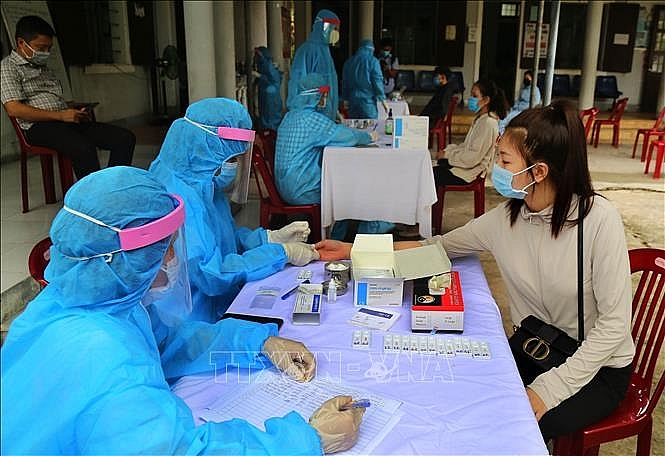Strengthening COVID-19 preparedness at grassroots level in Vietnam
 |
| COVID-19 continues to trouble Vietnam |
The World Bank and the Institute for Social Development Studies have signed an agreement for a $2.75-million grant provided by the Japan Social Development Fund for strengthening the preparedness and response to COVID-19 at the grassroots level in Vietnam.
As the name suggests, the project aims to strengthen response capacities for the pandemic and other health emergencies at the community level in the three proposed provinces Vinh Phuc, Khanh Hoa, and Long An. It is estimated that 270,000 people will benefit from the project’s intervention, with at least 3,500 people from vulnerable groups.
“The grassroots health system plays a crucial role as frontline defence against the pandemic,” said Rahul Kitchlu, acting country director for Vietnam at the World Bank. “The ongoing pandemic is exposing some gaps and highlights the need for capacity upgrades as the response system needs to be strong at all levels.”
As such, the project will focus on strengthening capacities of commune health stations with the provision of equipment and skills. It will help health workers get better at early detection of suspected cases and conduct an epidemiological investigation while minimising cross-infections within the health facilities. It will also help ensure the continuity of essential healthcare services during the pandemic.
The three-year project will also raise awareness and promote sustainable behavioural change in preparing and responding to health emergencies through risk communication. Scientific and fact-based information about COVID-19 transmission modes, suspected signs and symptoms, and prevention measures will be provided to health workers and community members alike. Some expected behaviours include correct mask wearing, appropriate handwashing, and environmental hygiene.
An innovative element of this project is the pilot intervention to address the needs of the most vulnerable groups during the pandemic. They include elderly people in urban areas, ethnic minorities, informal workers, people living with HIV/AIDS, drug users, and sex workers. It will leverage volunteer networks to reach about 3,500 people of these groups, offering them information about COVID-19 detection and prevention measures, psychological support, and in-kind assistance such as food, medication, and protective equipment.
Every day, there are about 10,000 new COVID-19 patients, and 300-400 casualties per day. On average, roughly 7,000-8,000 patients are being cured every day.
What the stars mean:
★ Poor ★ ★ Promising ★★★ Good ★★★★ Very good ★★★★★ Exceptional
 Tag:
Tag:
Themes: Together We Win
- Greater Mekong Subregion executives to discuss sustainable tourism
- TCPVN donates 1,200 medicine bags to COVID-19 patients in southwest
- AB InBev supports orphans with scholarships amid COVID-19
- Evaluating the reach of support in turbulent times
- Gamuda Land grants “Back to School” scholarships to support disadvantaged students
Related Contents
Latest News
More News
- Vietnam Television launches third 'Song Sau Lu' project for 2025 (December 15, 2025 | 08:00)
- Closing workshop highlights five-year impact of Fair for All project (December 12, 2025 | 16:22)
- Stakeholders mobilised before new child safety rules take effect (December 10, 2025 | 09:00)
- Vietnam receives emergency international relief as regional flooding intensifies (December 04, 2025 | 15:11)
- AmCham scholarships awarded to students (December 02, 2025 | 16:46)
- Vietjet flights carry love to devastated central region (November 28, 2025 | 11:35)
- SCG Sharing the Dream supports Vietnam’s youth and sustainable development goals (November 28, 2025 | 10:55)
- Siemens Caring Hands donates $34,700 for disaster relief in Vietnam (November 26, 2025 | 20:25)
- Ireland extends support for the Resilience First initiative (November 26, 2025 | 15:24)
- South Korea funds IOM relief for Vietnam’s typhoon-affected communities (November 24, 2025 | 15:33)


























 Mobile Version
Mobile Version